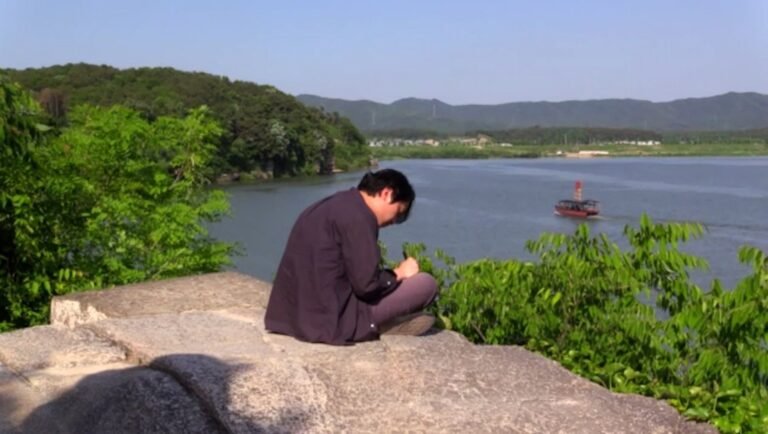After nearly half a decade of putting out two movies per year, Hong Sang-soo has slowed from a full-on sprint to a jogger’s pace, releasing a single 108-minute film in 2025 (although another is reported to be in post-production). Some of us follow Hong with a nearly religious devotion, lapping up each and every film — no matter how small, no matter how short — with dogmatic delight; others dip toes into the rushing river of the director’s tireless output only occasionally. The beauty of Hong is that either approach works: you can check in or out anytime you’d like. He’s always doing his thing, and the movies always meet you where you’re at — so long as where you’re at has good food and drink.
Hong’s latest essayistic missive What Does That Nature Say to You continues his fine tradition of spinning deceptively simple yarns set around characters (superficially) enjoying the company of one another, a setup that allows him to easily fold in his insatiable curiosity about life. Poet Donghwa drives his girlfriend Jun-hee from Seoul to visit her parents in the country, and, through a series of digressions, finds himself roped into staying for dinner with Jun-hee’s family. Hong standby Kwon Hae-hyo does great work as Jun-hee’s father Kim Oryeong, goading Donghwa with drinks and cigarettes up onto the small mountain they live under to politely interrogate him while Jun-hee and her sister Neung-hee commiserate inside.
Notably, What Does That Nature Say to You was shot in 480p. The effect is jarring at first, but it conjures a lo-fi bedroom IDM feeling, like Grimes cooking up Visions on her laptop or Aphex Twin assembling his own synthesizers, and the images Hong produces under the constraints ring true. A tree artifacts ever so slightly in a digital breeze; Donghwa points his phone flashlight on a purple flower during a late-night walk; at lunch, there’s a plastic sheen that captures what it was like to stumble upon similar-looking movies on TV, or maybe an early LCD computer monitor, late at night in the mid-2000s. A frame might seem totally pedestrian at first, but the longer Hong holds on it, the more beautiful it becomes: much like the aimless conversations he films, a quiet profundity emerges. If he keeps it up, shot in 480p could be the next back-to-mono.
And like any filmmaker worth their weight should, Hong bakes the form into the function. Donghwa is myopic, and he keeps glasses around but rarely wears them. “I don’t mind if my vision’s a little blurry,” he says atop the mountain with Oryeong. “I’ve lived with it for so long… I didn’t realize my eyes were bad.” The conversation itself starts lilting into a slight blur, and the verdant leaves behind our interlocutors take hold of our attention, the intoxicating association with people reflectively sipping makgeolli together bringing to mind our own foibles and secret wishes. In a generously sentimental move, Oryeong departs, the camera pulls back to reveal more of the landscape, and our poet takes out his notepad to jot down some notes. Then, because Hong is often funnier than we give him credit for, Oryeong returns with more alcohol and we zoom uncomfortably close. The frame is dirtier, less carefully composed, as Donghwa is yanked out of his artistic reverie.
Delightful character moments don’t just happen atop the mountain, either. Throughout, we get an expansive sense of these people: they’re not quite real, but they’re interesting and involving, the way movie characters ought to be. Late in the film, the truth is outed and Donghwa is revealed to be kind of a bad poet. It’s a classic scene, basically a trope, but Hong delivers it in such an understated way that it can be tempting to accuse him of plausibility. There’s enough movie magic, though, to indicate he’s up to something else. Jun-hee’s mom Sunhee — herself a poet — steals a look at Oryeong, perfectly telegraphing skepticism about his talent. Angry they don’t see how deeply he feels, Donghwa drunkenly rambles about the poet’s job, which is to find connections and make juxtapositions. Oryeong shrugs that he probably gave Dongwha too much to drink, knowing full well he precipitated the breakdown. It’s not exactly how the conversation would go in real life — and all the better for it. Hong has twisted a common climax and remade it in his own image so that we may learn from it and use it as an opportunity to reflect on how we might react — or might have reacted — when meeting a partner’s parents for the first time. And yes, it all happens in a single, muddy, static shot.
Yet there are stretches here that test one’s patience. A long walk through a local temple threatens to drift onto the wrong side of contemplative, even as it gives us the first little splinters in Jun-hee and Donghwa’s relationship. But Hong’s secret sauce is stacking a deck of those moments, showing cracks between the couple; the movie wouldn’t be complete without them. We have no idea where the relationship will go or whether it will end — Hong lets us continue the arc in our minds. “Eat your fill,” Sunhee says late into the dinner. We do, veggies and all, and leave What Does That Nature Say to You newly inquisitive about the relationships in our own lives.
Published as part of NYFF 2025 — Dispatch 4.


Comments are closed.